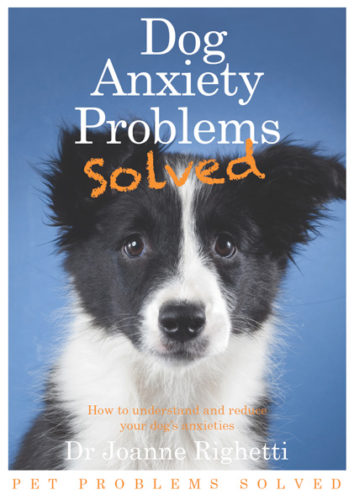Noise Phobias in Pets to Thunderstorms, Fireworks and Other Sounds
Understanding noise phobias in pets: Summary
- Noise phobias in pets are common, especially in dogs, perhaps due to negative experiences or lack of exposure when young,
- Management of the noise problem is important including keeping the pet safe and giving them comforting items.
- Long term solutions involve desensitising the pet to the anxiety-provoking sounds. Medication may also help.
Understanding noise phobias in pets, including dogs and cats
Noise phobias and sound sensitivities in pets are common behaviour issues. Our dogs especially may react to unwelcome sounds including thunder, fireworks, sirens, lawnmowers and even pots and pans banging. Cats may run and hide. It help to understand these sensitivities, fears, anxieties and phobias.
If your pet is sensitive to sounds, you are not alone. Noise phobias are one of the most common problem that pet owners face. Noise phobias can, however, be overcome.
We tend to talk more about these phobias in our dogs as their outward signs are more obvious. Similar causes are found in cats too.
Most dogs learn, early on in life, that sounds and noises are relatively predictable and not particularly stimulating, therefore do not react to them. Dogs that react to particular noises tend to do so when they have not been introduced to that sound when young. They have had no experience of that sound or they have possibly had a negative experience.
Common noise anxieties include thunderstorms, fireworks, lawn mowers, vacuum cleaners and other sounds only heard irregularly such as party music or dropping pots and pans.
Symptoms of noise anxieties
Symptoms that dogs may express when they are sensitive to noise include:
– Trying to escape
– Avoiding the noise e.g. hiding under a bed
– Howling or barking at the sound
– Lowered body posture, tail between legs and ears back
– Running around frantically

Solving the noise phobic problem
Long term solutions for the noise phobic dog
1. Prevention is better than cure
The best long term solution for noise phobias is prevention. We can ensure our dogs do not develop anxiety towards noises by socialising them to lots of different noises when they are puppies. Introduce them to noisy household objects. Take them out into the streets, visit the vet clinic and so on.
It is not so easy to organise a thunderstorm, however! It may be worth downloading sounds of storms and playing these to your puppy. Combine them with a positive experience such as dinner time, play or pats to create a pleasant association with these sounds.
2. Be more noisy!
If your dog is scared of noises, it could be that you have a very quiet household. Your dog will benefit from having lots of noise around, while you behave normally. If this is too stressful for you, try leaving music playing or talkback radio on or record noises and play them back to your dog while you are away from home.
3. Desenitisation
If your dog is afraid of thunder or other noises, the long term solution is to desensitise your dog to the sounds. This involves playing the noises to your dog at a very low level, then gradually increasing the exposure to the noise. The experience should be kept as positive as possible for your dog.
Commercially available CDs of sounds for dogs are available, or you can make recordings of noises, and play these back to your dog while you pair them up with dinner or a play session in the backyard. Remember that you should place speakers at different locations around your home.
Thunderstorm noise tends to come from outdoors so locate your speakers there. Sound desensitisation should begin months before the storm or firework season for best effects but with consistent application you should see improvements in your dog’s anxiety within a month.
There is little we can do to recreate atmospheric pressure changes that may be associated with storm build up and to which your dog may be highly sensitive. Some of the canine anti-anxiety capes claim to have anti-static properties which may help.
Adapt your desensitisation plan according to your dog’s sensitivities. If they hate the sound of traffic light crossings, for instance (yes, this is more common than you might think!), record these sounds on your phone and stay to play them at home. after your dog is used to this, then take them our in the streets but keep a distance from any crossings, until you are sure that your dog no longer reacts.
Desensitisation is all about going at your dog’s pace.
Here are more tips for thunder storm phobic pets.

Short term solutions for the dog with noise phobias
The following strategies may help your dog cope with noise:
- Try relocating your dog to a different area of your home so they cannot hear the noise. Bring your dog indoors or into an internal laundry or utility room.
- Build a few den-like areas for your dog to retreat to. These could be cupboards, under tables, under your house or a covered crate.
- Close your blinds and curtains, leave the lights and radio or television on, so that outdoor noises and flashes are masked.
- Leave your dog with a lavender heat pack, a warm hot water bottle or a cuddly toy for comfort. Behave normally. Reward your dog for calm behaviour.
- Try an Anxiety Wrap on your dog, but start long before any thunder storm starts.
- Consult your vet for medication, both for on the specific day of the thunderstorm and a longer term option to reduce the anxiety.
Frequently asked questions about sound phobias in pets
Can cats have noise phobias?
Any animal can dislike noise. Cats may hide when the vacuum cleaner is produced. You can try playing the sounds your cat dislikes at a low volume and gradually increasing it. Remember they may also be reacting to movements or the scent of items too.
Do deaf animals still have noise phobias?
One of the advantages of having a deaf pet is that they generally no longer react to loud noises. They can still be aware of other associated factors, however. Dogs, for instance, may know that a thunderstorm is approaching due to changes in atmospheric pressure.
Does my dog hate my music?
Most dogs love our music because we love our music. If you are relaxed listening to it, they will be too. Try leaving music on when you leave your dog alone or enjoy a dance together!
Is your dog scared of loud noises? New research shows that there could be a link between canine noise phobias and pain in our dogs…
Canine Noise Phobias and Pain could be related
Animal behavioural scientists from the UK and Brazil examined dogs who were sensitivity to noises and found that those which also had associated pain formed a greater sensitivity to noise.Why would this happen?
Well, if your dog is sensitive to noise, as many are and they react by moving or by tensing up their bodies when the noise occurs, this may exacerbate any existing pain, as extra stress is put on already inflamed muscles or joints. That pain is then associated with the noise, making them fear it more. A painful, noisy cycle for your dog!
The researchers also found that this condition appeared later in the dogs’ lives. Of course, dogs can be scared of noises at any age and it is worth seeking treatment if your dog has a sound phobia. If your dog is older and begins to be sensitive to noises, then you should ask your vet to check for muscular-skeletal pain in your dog.
Dogs with or without pain show typical behavioural symptoms of shaking, trembling and hiding with exposure to sounds but those with a diagnosed pain issue also showed a higher level of avoidance of places that they had a bad experience with noise. So your dog may avoid going along a street where they know that a siren may go off or they may avoid the kitchen at home, if you routinely make bangs and crashed as you cook.
Dogs with fears often tend to generalise fears too, making the situation worse. So not only does the noise sensitive dog start to avoid the location where they may hear the noises they dislike, they also avoid anything within that area. Perhaps they begin to have an aversion to the dog park, if the gate clangs shut near them but this extends to avoiding contact with any dogs in the park. Dogs with chronic pain often cease playing with other dogs and aggression towards dogs can increase.
How to alleviate the pain-sound canine case
If your dog has sound sensitivities, you should discuss this with your vet. If you suspect your dog in is pain, you should not only get it treated but also look at any concurrent behavioural changes that you have observed. Veterinarians and behaviourists should carefully assess dogs with noise sensitivities for pain-related problems.
Dog Anxiety Problems Solved
More information, including case studies on sound phobias, is included in Dr Jo Righetti’s ebook Dog Anxiety Problems Solved.

About the author: Dr Jo Righetti
Dr Jo Righetti is an animal behaviourist, helping people with pets. With a PhD in behaviour, a diploma in counselling and over 20 years experience in business Pet Problems Solved, Dr Jo understand pets and communicates here knowledge in a motivational manner.
You might also like to read about other dog behaviour issues and their solutions…
- Relaxing your pets with music, audiobooks and moviesRelaxing your pets with music, audiobooks and movies Is it possible to relax stressed pets by playing them music, audiobooks or watching movies? Dr Jo explores recent studies that look at effects audio and visual media have on our pets… Pets can get stressed Maybe it’s your pampered pooch at home who shakes at the sound
- How to Stop Your Dog from Jumping and Climbing the FenceHow to Stop Your Dog from Jumping and Climbing the Fence Has your dog ever escaped from your backyard? Some dogs are pure escape artists and others just seize the occasional opportunity to dig under or jump over the fence. Annie Moore from Best Dog Crates tells us how to stop your dog from jumping
- Did You Know That Desexing your male dog could result in unwanted behaviour?Desexing your male dog could result in unwanted behaviour! Dog owners: Do you have a male dog? Is your dog desexed (neutered) ? At what age was your dog neutered? And does your dog have any problem behaviours? Questions we may all be asking after reading the result of recent research. We are all advised
- The Lazy Guide to Dog TrainingThe Lazy Guide to Dog training by animal behaviourist (and lazy dog trainer!) Dr Jo Righetti… This blog post is part of the 2018 #Train4Rewards Blog Party Why I call myself a Lazy Dog Trainer I am NOT a dog trainer. Yes, I do help people with their pet’s behavioural problems. But I cannot call
- A Day In The Life of A Pet Care CentreDo you ever wish that your dog was better behaved or perhaps just had more activities to occupy them? A pet care centre could be the answer and I’ve asked Tristram Walker, Manager of the West Coast Pet Care Centre to tell us about a day in the life of their centre… A Day In The
- Road tripping with a dog with car anxietyIf your dog is anxious while you travel, these tips, from Sarah Archer at Your Best Digs, may help… Road tripping with a dog with car anxiety Before they get a dog, everyone imagines a road trip with them to be like what they see on television. There are happy pooches having the best time
- Top 10 Problem Pets – and Problem Pet BehaviourAre you frustrated, angry or puzzled y your pet’s behaviour? Here’s your guide to the top 10 problem pets and problem cat behaviour and dog behaviour…
- Does The Anxiety Wrap work?Does the Anxiety Wrap Work? Does your dog suffer from anxieties, fears or phobias? Stress is common in our pet dogs and most owners want to find relief for their dog’s anxiety. We asked does the anxiety wrap work? What is The Anxiety Wrap? The Anxiety Wrap® uses gentle, constant, maintained pressure to relieve stress
- Predicting the behaviour of rescue dogs. New Research to Improve AdoptabilityPredicting the behaviour of rescue dogs : It’s difficult to compare a shelter to a sofa! Are you thinking about adopting a rescue dog from a shelter? Or perhaps, like all my dogs and cats, you already have a shelter pet. Are you worried that they may have behaviour problems? New research has provided insight
More dog behaviours explained at Purina Australia.

And here’s a few cat issues too…
- Pets and water sprays: No way!Pets and water sprays People often tell me that they use a water spray to correct their pet’s behaviour. They say it works, as the pet stops doing whatever unwanted behaviour they were doing at the time of the spray. Let me give you the reasons why a water spray cannot help your pet’s behaviour in the
- Cats use of litter box is determined by sight, not scentCats use of litter box determined by sight, not scent You might think your cat’s litter box is clean , even if they have already used it. Research shows, however, that cats use of litter box is determined by sight, not scent Cat toileting habits Cats are so clean. They come litter trained as kittens.
- How to Keep Pets Calm in Stressful SituationsAll pets get stressed at times and some are in a constant state of anxiety, so it helps to know how to keep pets calm in stressful situations. Michael Karp from Entirely Pets has summed up how we can tell if our pets are stressed and what we can do about it… How to Keep
- Australia’s cats kill 650 million reptiles a year!At Pet Problems Solved, we LOVE cats. But cats hunt, it’s inevitable. Indoors they hunt toys, food or us. Outdoors they hunt wildlife. New research, explained in The Conversation, points to 650 million reptiles every year! A hidden toll: Australia’s cats kill almost 650 million reptiles a year A feral cat snapped by a remote
- Ask Dr Jo – Your Cat Q&As (With adorable Cats to watch!)Ask Dr Jo – Your Cat Q&As in the Fancy Feast Lounge Enjoy our cat videos, and get your feline questions answered, in my series of Cat Q&As in the Fancy Feast Lounge. You’ll see my cats enjoying themselves (and probably misbehaving too!)… Ask Dr Jo: How can I tell if my cat is bored?






